

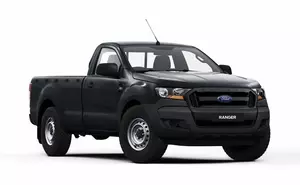
2019 Ranger III Regular Cab (facelift 2019)

2019 Ranger IV Raptor (Americas)

2019 Ranger III Double Cab (facelift 2019)

2019 Ranger III Super Cab (facelift 2019)
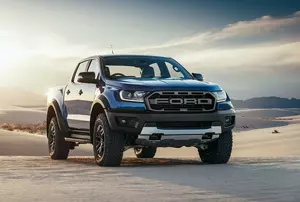
2019 Ranger III Raptor (facelift 2019)

2015 Ranger III Double Cab (facelift 2015)

2015 Ranger III Super Cab (facelift 2015)

2015 Ranger III Single Cab (facelift 2015)
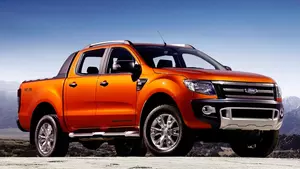
Ranger III Double Cab
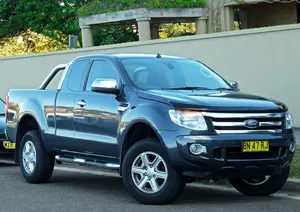
Ranger III Super Cab
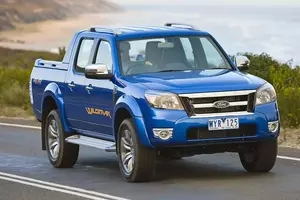
2009 Ranger II Double Cab (facelift 2009)

2009 Ranger II Super Cab (facelift 2009)

2006 Ranger II Double Cab

2006 Ranger II Super Cab

Ranger I Super Cab
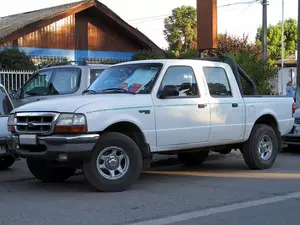
Ranger I Double Cab

| Vehicle | Curb weight | Difference from world's smallest | Weight to power ratio | 0—60 mph acceleration ratio | Consumption ratio |
|---|---|---|---|---|---|
| 2.0 EcoBlue |
2018 kg / 4450 lbs |
1593 kg (3513 lbs) heavier | 12 kg to 1 hp | 194 kg/s (428 lbs/s) |
292 kg/L (644 lbs/L) |
| Vehicle | 2.0 EcoBlue |
|---|---|
| Curb weight |
2018 kg / 4450 lbs |
| Difference from world's smallest | 1593 kg (1593 lbs) heavier |
| Weight to power ratio | 12 kg to 1 hp |
| 0—60 mph acceleration ratio | 194 kg/s (428 lbs/s) |
| Consumption ratio |
292 kg/L (644 lbs/L) |

| Vehicle | Curb weight | Difference from world's smallest | Weight to power ratio | 0—60 mph acceleration ratio | Consumption ratio |
|---|---|---|---|---|---|
| 2.0d |
2332 kg / 5142 lbs |
1907 kg (4205 lbs) heavier | 11 kg to 1 hp | - |
284 kg/L (626 lbs/L) |
| Vehicle | 2.0d |
|---|---|
| Curb weight |
2332 kg / 5142 lbs |
| Difference from world's smallest | 1907 kg (1907 lbs) heavier |
| Weight to power ratio | 11 kg to 1 hp |
| 0—60 mph acceleration ratio | - |
| Consumption ratio |
284 kg/L (626 lbs/L) |

| Vehicle | Curb weight | Difference from world's smallest | Weight to power ratio | 0—60 mph acceleration ratio | Consumption ratio |
|---|---|---|---|---|---|
| 2.0 EcoBlue |
2234 kg / 4926 lbs |
1809 kg (3989 lbs) heavier | 10 kg to 1 hp | 260 kg/s (573 lbs/s) |
290 kg/L (639 lbs/L) |
| 3.2 Duratorq TDCi |
2246 kg / 4952 lbs |
1821 kg (4015 lbs) heavier | 11 kg to 1 hp | 222 kg/s (490 lbs/s) |
236 kg/L (520 lbs/L) |
| Vehicle | 2.0 EcoBlue |
|---|---|
| Curb weight |
2234 kg / 4926 lbs |
| Difference from world's smallest | 1809 kg (1809 lbs) heavier |
| Weight to power ratio | 10 kg to 1 hp |
| 0—60 mph acceleration ratio | 260 kg/s (573 lbs/s) |
| Consumption ratio |
290 kg/L (639 lbs/L) |
| Vehicle | 3.2 Duratorq TDCi |
| Curb weight |
2246 kg / 4952 lbs |
| Difference from world's smallest | 1821 kg (1821 lbs) heavier |
| Weight to power ratio | 11 kg to 1 hp |
| 0—60 mph acceleration ratio | 222 kg/s (490 lbs/s) |
| Consumption ratio |
236 kg/L (520 lbs/L) |

| Vehicle | Curb weight | Difference from world's smallest | Weight to power ratio | 0—60 mph acceleration ratio | Consumption ratio |
|---|---|---|---|---|---|
| 2.0 EcoBlue |
2073 kg / 4571 lbs |
1648 kg (3634 lbs) heavier | 12 kg to 1 hp | 197 kg/s (434 lbs/s) |
300 kg/L (662 lbs/L) |
| Vehicle | 2.0 EcoBlue |
|---|---|
| Curb weight |
2073 kg / 4571 lbs |
| Difference from world's smallest | 1648 kg (1648 lbs) heavier |
| Weight to power ratio | 12 kg to 1 hp |
| 0—60 mph acceleration ratio | 197 kg/s (434 lbs/s) |
| Consumption ratio |
300 kg/L (662 lbs/L) |

| Vehicle | Curb weight | Difference from world's smallest | Weight to power ratio | 0—60 mph acceleration ratio | Consumption ratio |
|---|---|---|---|---|---|
| 2.0 EcoBlue |
2510 kg / 5535 lbs |
2085 kg (4598 lbs) heavier | 12 kg to 1 hp | 264 kg/s (582 lbs/s) |
282 kg/L (622 lbs/L) |
| Vehicle | 2.0 EcoBlue |
|---|---|
| Curb weight |
2510 kg / 5535 lbs |
| Difference from world's smallest | 2085 kg (2085 lbs) heavier |
| Weight to power ratio | 12 kg to 1 hp |
| 0—60 mph acceleration ratio | 264 kg/s (582 lbs/s) |
| Consumption ratio |
282 kg/L (622 lbs/L) |

| Vehicle | Curb weight | Difference from world's smallest | Weight to power ratio | 0—60 mph acceleration ratio | Consumption ratio |
|---|---|---|---|---|---|
| 2.2 TDCi |
2119 kg / 4672 lbs |
1694 kg (3735 lbs) heavier | 13 kg to 1 hp | 174 kg/s (384 lbs/s) |
265 kg/L (584 lbs/L) |
| 3.2 TDCi |
2167 kg / 4778 lbs |
1742 kg (3841 lbs) heavier | 11 kg to 1 hp | 215 kg/s (474 lbs/s) |
243 kg/L (536 lbs/L) |
| Vehicle | 2.2 TDCi |
|---|---|
| Curb weight |
2119 kg / 4672 lbs |
| Difference from world's smallest | 1694 kg (1694 lbs) heavier |
| Weight to power ratio | 13 kg to 1 hp |
| 0—60 mph acceleration ratio | 174 kg/s (384 lbs/s) |
| Consumption ratio |
265 kg/L (584 lbs/L) |
| Vehicle | 3.2 TDCi |
| Curb weight |
2167 kg / 4778 lbs |
| Difference from world's smallest | 1742 kg (1742 lbs) heavier |
| Weight to power ratio | 11 kg to 1 hp |
| 0—60 mph acceleration ratio | 215 kg/s (474 lbs/s) |
| Consumption ratio |
243 kg/L (536 lbs/L) |

| Vehicle | Curb weight | Difference from world's smallest | Weight to power ratio | 0—60 mph acceleration ratio | Consumption ratio |
|---|---|---|---|---|---|
| 3.2 TDCi |
2086 kg / 4600 lbs |
1661 kg (3663 lbs) heavier | 10 kg to 1 hp | 211 kg/s (465 lbs/s) |
240 kg/L (529 lbs/L) |
| 2.2 TDCi |
2013 kg / 4439 lbs |
1588 kg (3502 lbs) heavier | 15 kg to 1 hp | 142 kg/s (313 lbs/s) |
288 kg/L (635 lbs/L) |
| Vehicle | 3.2 TDCi |
|---|---|
| Curb weight |
2086 kg / 4600 lbs |
| Difference from world's smallest | 1661 kg (1661 lbs) heavier |
| Weight to power ratio | 10 kg to 1 hp |
| 0—60 mph acceleration ratio | 211 kg/s (465 lbs/s) |
| Consumption ratio |
240 kg/L (529 lbs/L) |
| Vehicle | 2.2 TDCi |
| Curb weight |
2013 kg / 4439 lbs |
| Difference from world's smallest | 1588 kg (1588 lbs) heavier |
| Weight to power ratio | 15 kg to 1 hp |
| 0—60 mph acceleration ratio | 142 kg/s (313 lbs/s) |
| Consumption ratio |
288 kg/L (635 lbs/L) |

| Vehicle | Curb weight | Difference from world's smallest | Weight to power ratio | 0—60 mph acceleration ratio | Consumption ratio |
|---|---|---|---|---|---|
| 2.2 TDCi |
1749 kg / 3857 lbs |
1324 kg (2920 lbs) heavier | 11 kg to 1 hp | - |
233 kg/L (514 lbs/L) |
| 3.2 TDCi |
1969 kg / 4342 lbs |
1544 kg (3405 lbs) heavier | 10 kg to 1 hp | - |
237 kg/L (523 lbs/L) |
| 2.5 |
1670 kg / 3682 lbs |
1245 kg (2745 lbs) heavier | 10 kg to 1 hp | - | - |
| Vehicle | 2.2 TDCi |
|---|---|
| Curb weight |
1749 kg / 3857 lbs |
| Difference from world's smallest | 1324 kg (1324 lbs) heavier |
| Weight to power ratio | 11 kg to 1 hp |
| 0—60 mph acceleration ratio | - |
| Consumption ratio |
233 kg/L (514 lbs/L) |
| Vehicle | 3.2 TDCi |
| Curb weight |
1969 kg / 4342 lbs |
| Difference from world's smallest | 1544 kg (1544 lbs) heavier |
| Weight to power ratio | 10 kg to 1 hp |
| 0—60 mph acceleration ratio | - |
| Consumption ratio |
237 kg/L (523 lbs/L) |
| Vehicle | 2.5 |
| Curb weight |
1670 kg / 3682 lbs |
| Difference from world's smallest | 1245 kg (1245 lbs) heavier |
| Weight to power ratio | 10 kg to 1 hp |
| 0—60 mph acceleration ratio | - |
| Consumption ratio | - |

| Vehicle | Curb weight | Difference from world's smallest | Weight to power ratio | 0—60 mph acceleration ratio | Consumption ratio |
|---|---|---|---|---|---|
| 2.2 TDCi |
2048 kg / 4516 lbs |
1623 kg (3579 lbs) heavier | 16 kg to 1 hp | 144 kg/s (318 lbs/s) |
269 kg/L (593 lbs/L) |
| 2.5 |
2048 kg / 4516 lbs |
1623 kg (3579 lbs) heavier | 12 kg to 1 hp | 188 kg/s (415 lbs/s) |
190 kg/L (419 lbs/L) |
| 3.2 TDCi |
2083 kg / 4593 lbs |
1658 kg (3656 lbs) heavier | 10 kg to 1 hp | 210 kg/s (463 lbs/s) |
200 kg/L (441 lbs/L) |
| Vehicle | 2.2 TDCi |
|---|---|
| Curb weight |
2048 kg / 4516 lbs |
| Difference from world's smallest | 1623 kg (1623 lbs) heavier |
| Weight to power ratio | 16 kg to 1 hp |
| 0—60 mph acceleration ratio | 144 kg/s (318 lbs/s) |
| Consumption ratio |
269 kg/L (593 lbs/L) |
| Vehicle | 2.5 |
| Curb weight |
2048 kg / 4516 lbs |
| Difference from world's smallest | 1623 kg (1623 lbs) heavier |
| Weight to power ratio | 12 kg to 1 hp |
| 0—60 mph acceleration ratio | 188 kg/s (415 lbs/s) |
| Consumption ratio |
190 kg/L (419 lbs/L) |
| Vehicle | 3.2 TDCi |
| Curb weight |
2083 kg / 4593 lbs |
| Difference from world's smallest | 1658 kg (1658 lbs) heavier |
| Weight to power ratio | 10 kg to 1 hp |
| 0—60 mph acceleration ratio | 210 kg/s (463 lbs/s) |
| Consumption ratio |
200 kg/L (441 lbs/L) |

| Vehicle | Curb weight | Difference from world's smallest | Weight to power ratio | 0—60 mph acceleration ratio | Consumption ratio |
|---|---|---|---|---|---|
| 2.5 |
2048 kg / 4516 lbs |
1623 kg (3579 lbs) heavier | 12 kg to 1 hp | 188 kg/s (415 lbs/s) |
190 kg/L (419 lbs/L) |
| 2.2 TDCi |
2012 kg / 4436 lbs |
1587 kg (3499 lbs) heavier | 13 kg to 1 hp | 171 kg/s (377 lbs/s) |
214 kg/L (472 lbs/L) |
| 3.2 TDCi |
2073 kg / 4571 lbs |
1648 kg (3634 lbs) heavier | 10 kg to 1 hp | 212 kg/s (467 lbs/s) |
218 kg/L (481 lbs/L) |
| Vehicle | 2.5 |
|---|---|
| Curb weight |
2048 kg / 4516 lbs |
| Difference from world's smallest | 1623 kg (1623 lbs) heavier |
| Weight to power ratio | 12 kg to 1 hp |
| 0—60 mph acceleration ratio | 188 kg/s (415 lbs/s) |
| Consumption ratio |
190 kg/L (419 lbs/L) |
| Vehicle | 2.2 TDCi |
| Curb weight |
2012 kg / 4436 lbs |
| Difference from world's smallest | 1587 kg (1587 lbs) heavier |
| Weight to power ratio | 13 kg to 1 hp |
| 0—60 mph acceleration ratio | 171 kg/s (377 lbs/s) |
| Consumption ratio |
214 kg/L (472 lbs/L) |
| Vehicle | 3.2 TDCi |
| Curb weight |
2073 kg / 4571 lbs |
| Difference from world's smallest | 1648 kg (1648 lbs) heavier |
| Weight to power ratio | 10 kg to 1 hp |
| 0—60 mph acceleration ratio | 212 kg/s (467 lbs/s) |
| Consumption ratio |
218 kg/L (481 lbs/L) |

| Vehicle | Curb weight | Difference from world's smallest | Weight to power ratio | 0—60 mph acceleration ratio | Consumption ratio |
|---|---|---|---|---|---|
| 2.5 TDCi |
1845 kg / 4068 lbs |
1420 kg (3131 lbs) heavier | 13 kg to 1 hp | - | - |
| Vehicle | 2.5 TDCi |
|---|---|
| Curb weight |
1845 kg / 4068 lbs |
| Difference from world's smallest | 1420 kg (1420 lbs) heavier |
| Weight to power ratio | 13 kg to 1 hp |
| 0—60 mph acceleration ratio | - |
| Consumption ratio | - |

| Vehicle | Curb weight | Difference from world's smallest | Weight to power ratio | 0—60 mph acceleration ratio | Consumption ratio |
|---|---|---|---|---|---|
| 2.5 TDCi |
1845 kg / 4068 lbs |
1420 kg (3131 lbs) heavier | 13 kg to 1 hp | - | - |
| Vehicle | 2.5 TDCi |
|---|---|
| Curb weight |
1845 kg / 4068 lbs |
| Difference from world's smallest | 1420 kg (1420 lbs) heavier |
| Weight to power ratio | 13 kg to 1 hp |
| 0—60 mph acceleration ratio | - |
| Consumption ratio | - |

| Vehicle | Curb weight | Difference from world's smallest | Weight to power ratio | 0—60 mph acceleration ratio | Consumption ratio |
|---|---|---|---|---|---|
| 3.0 TDCi |
1802 kg / 3973 lbs |
1377 kg (3036 lbs) heavier | 12 kg to 1 hp | - | - |
| 2.5 TDCi |
1955 kg / 4311 lbs |
1530 kg (3374 lbs) heavier | 14 kg to 1 hp | 158 kg/s (348 lbs/s) | - |
| Vehicle | 3.0 TDCi |
|---|---|
| Curb weight |
1802 kg / 3973 lbs |
| Difference from world's smallest | 1377 kg (1377 lbs) heavier |
| Weight to power ratio | 12 kg to 1 hp |
| 0—60 mph acceleration ratio | - |
| Consumption ratio | - |
| Vehicle | 2.5 TDCi |
| Curb weight |
1955 kg / 4311 lbs |
| Difference from world's smallest | 1530 kg (1530 lbs) heavier |
| Weight to power ratio | 14 kg to 1 hp |
| 0—60 mph acceleration ratio | 158 kg/s (348 lbs/s) |
| Consumption ratio | - |

| Vehicle | Curb weight | Difference from world's smallest | Weight to power ratio | 0—60 mph acceleration ratio | Consumption ratio |
|---|---|---|---|---|---|
| 3.0 TDCi |
1802 kg / 3973 lbs |
1377 kg (3036 lbs) heavier | 12 kg to 1 hp | 140 kg/s (309 lbs/s) |
177 kg/L (390 lbs/L) |
| 2.5 TDCi |
1845 kg / 4068 lbs |
1420 kg (3131 lbs) heavier | 13 kg to 1 hp | 155 kg/s (342 lbs/s) |
207 kg/L (456 lbs/L) |
| Vehicle | 3.0 TDCi |
|---|---|
| Curb weight |
1802 kg / 3973 lbs |
| Difference from world's smallest | 1377 kg (1377 lbs) heavier |
| Weight to power ratio | 12 kg to 1 hp |
| 0—60 mph acceleration ratio | 140 kg/s (309 lbs/s) |
| Consumption ratio |
177 kg/L (390 lbs/L) |
| Vehicle | 2.5 TDCi |
| Curb weight |
1845 kg / 4068 lbs |
| Difference from world's smallest | 1420 kg (1420 lbs) heavier |
| Weight to power ratio | 13 kg to 1 hp |
| 0—60 mph acceleration ratio | 155 kg/s (342 lbs/s) |
| Consumption ratio |
207 kg/L (456 lbs/L) |

| Vehicle | Curb weight | Difference from world's smallest | Weight to power ratio | 0—60 mph acceleration ratio | Consumption ratio |
|---|---|---|---|---|---|
| 2.5 TDCi |
1399 kg / 3085 lbs |
974 kg (2148 lbs) heavier | 13 kg to 1 hp | - | - |
| 3.0 V6 |
1397 kg / 3080 lbs |
972 kg (2143 lbs) heavier | 9 kg to 1 hp | - | - |
| 4.0 V6 |
1399 kg / 3085 lbs |
974 kg (2148 lbs) heavier | 7 kg to 1 hp | - | - |
| 2.3 |
1397 kg / 3080 lbs |
972 kg (2143 lbs) heavier | 10 kg to 1 hp | - | - |
| Vehicle | 2.5 TDCi |
|---|---|
| Curb weight |
1399 kg / 3085 lbs |
| Difference from world's smallest | 974 kg (974 lbs) heavier |
| Weight to power ratio | 13 kg to 1 hp |
| 0—60 mph acceleration ratio | - |
| Consumption ratio | - |
| Vehicle | 3.0 V6 |
| Curb weight |
1397 kg / 3080 lbs |
| Difference from world's smallest | 972 kg (972 lbs) heavier |
| Weight to power ratio | 9 kg to 1 hp |
| 0—60 mph acceleration ratio | - |
| Consumption ratio | - |
| Vehicle | 4.0 V6 |
| Curb weight |
1399 kg / 3085 lbs |
| Difference from world's smallest | 974 kg (974 lbs) heavier |
| Weight to power ratio | 7 kg to 1 hp |
| 0—60 mph acceleration ratio | - |
| Consumption ratio | - |
| Vehicle | 2.3 |
| Curb weight |
1397 kg / 3080 lbs |
| Difference from world's smallest | 972 kg (972 lbs) heavier |
| Weight to power ratio | 10 kg to 1 hp |
| 0—60 mph acceleration ratio | - |
| Consumption ratio | - |

| Vehicle | Curb weight | Difference from world's smallest | Weight to power ratio | 0—60 mph acceleration ratio | Consumption ratio |
|---|---|---|---|---|---|
| 2.5 TDCi |
1399 kg / 3085 lbs |
974 kg (2148 lbs) heavier | 13 kg to 1 hp | - | - |
| Vehicle | 2.5 TDCi |
|---|---|
| Curb weight |
1399 kg / 3085 lbs |
| Difference from world's smallest | 974 kg (974 lbs) heavier |
| Weight to power ratio | 13 kg to 1 hp |
| 0—60 mph acceleration ratio | - |
| Consumption ratio | - |